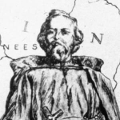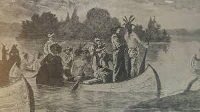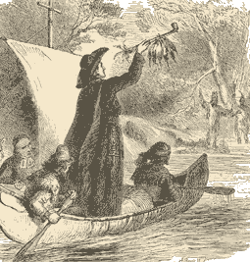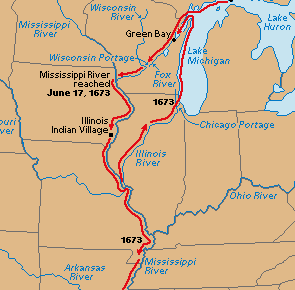The Explorer Father Jacques Marquette
Father Jacques Marquette was a French explorer and missionary who, with Louis Jolliet, in the late 17th Century explored much of the Mississippi River and the land into which it drained. 
Marquette was born on June 1, 1637 in Laon, France. He studied the Jesuit religion at Nancy and, after further religious study, asked to become a missionary. He was sent to New France, in North America. He arrived in Quebec in September 1666. Marquette stayed in Trois-Rivières, studying the Montagnais language for a couple of years, then went to Montreal. He made friends of the Illinois tribe, in 1671, founded the mission of St. Ignace at the junction of Lake Huron and Lake Michigan. The following year arrived Louis Jolliet, with a set of orders from New France Governor Louis de Buade de Frontenac to explore the rivers of the western part of New France and, if possible, to reach the Pacific Ocean. Marquette joined the expedition, and the two spent the winter of 1672-1673 planning. 
In May 1673, they set off. They were also looking for the fabled Northwest Passage, a sea route connecting the Atlantic Ocean and the Pacific Ocean. The pair, along with a handful of other French explorers, paddled their canoes across Lake Michigan to what is now Green Bay. They turned up the Fox River to what is now Portage, Wis., and then did what the name suggests–carry their canoes–overland to the Wisconsin River. They carried on down that river and, on June 17, encountered the broad expanse of the mighty Mississippi. He spoke the languages of six Native American tribes: Fox, Huron, Mackinac, Ottawa, Pottawatomi, and Sioux. This helped in their various encounters with different tribes, who spoke the same or similar languages. 
Marquette and Jolliet paddled down the Mississippi, at one point encountering a peaceful group of the Illinois tribe, whose chief presented them with a calumet, or peace pipe. Onward they went. When they reached the mouth of the Arkansas River, they found themselves surrounded by another tribe, armed with guns. By showing the calumet, the French explorers convinced the Native Americans to put down their guns and have a discussion, during which Marquette and Jolliet learned that further south were many more men armed with many more guns–Spanish explorers who were out for conquest. The French explorers returned north, taking a slight detour up the Illinois River, passing by what is now Chicago at one point. They returned to Canada, having traversed more than 2,500 miles in four months. They did their duty by claiming all of the land that they could see for their king, Louis XIV of France. 
The pair went their separate ways after that. Jolliet went on to Sault Sainte Marie and then to Quebec. Marquette by this time was unsell and stayed at a mission at what is now Green Bay for a year before going back south a bit to the Illinois country in October 1674. Among other things, Marquette had struggled with dysentery; this malady struck again, and he spent the winter not far from what is now Chicago. He attended a large gathering of Native American leaders on the Illinois river in spring 1675 and then turned northward, intending to reach St. Ignace. He didn't make it. Marquette died on May 18, 1675, near what is now Ludington, Mich. He spent his last moments near the mouth of a river that is now named for him: Père Marquette. A written account of what he saw during his explorations was published in 1681. An excerpt from this journal follows, in which Marquette talks about the calumet (peace pipe): There remains no more, except to speak of the Calumet. There is nothing more mysterious or more respected among them. Less honor is paid to the Crowns and scepters of Kings than the Savages bestow upon this. It seems to be the God of peace and of war, the Arbiter of life and of death. It has but to be carried upon one's person, and displayed, to enable one to walk safely through the midst of Enemies -who, in the hottest of the Fight, lay down Their arms when it is shown. For That reason, the Ilinois gave me one, to serve as a safeguard among all the Nations through whom I had to pass during my voyage. Marquette's journeys and writings helped pave the way for further settlement in the areas he explored and helped expand the burgeoning fur trade. |
|
Social Studies for Kids
copyright 2002–2025
David White




